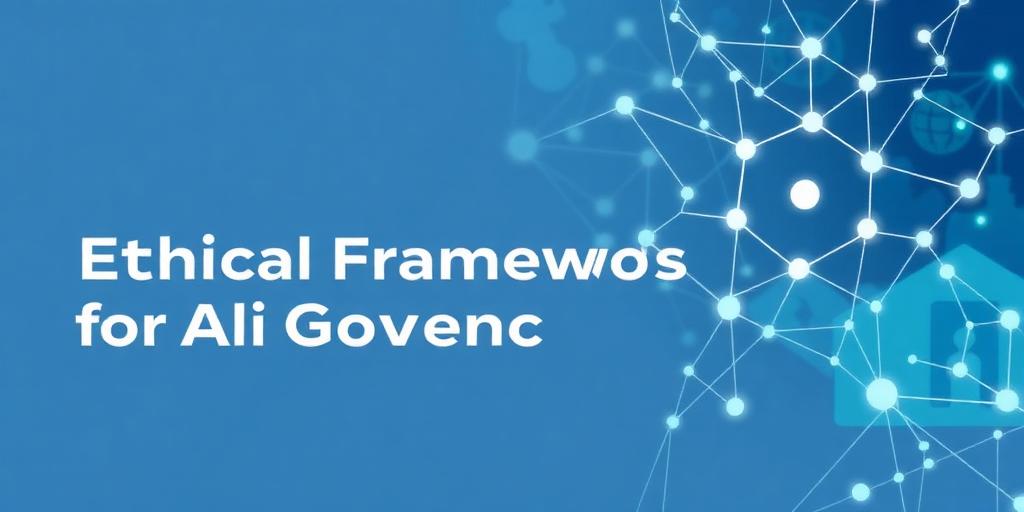Ethical Frameworks for AI Governance
Artificial intelligence (AI) is rapidly transforming industries and societies, offering unprecedented opportunities and raising complex ethical challenges. Effective AI governance requires robust ethical frameworks to guide its development and deployment. This post explores key ethical frameworks that organizations and policymakers can adopt to ensure AI systems are aligned with human values, promote fairness, and mitigate potential risks.
1. Understanding the Need for Ethical AI Frameworks
AI systems, while powerful, are not inherently neutral. They can perpetuate biases present in the data they are trained on, leading to discriminatory outcomes. Additionally, the lack of transparency in AI decision-making processes can erode trust and accountability. Ethical frameworks provide a structured approach to addressing these issues by:
- Defining Ethical Principles: Establishing clear guidelines on fairness, transparency, and accountability.
- Providing Practical Guidance: Offering actionable steps for implementing ethical considerations throughout the AI lifecycle.
- Ensuring Compliance: Helping organizations meet regulatory requirements and industry standards.
2. Key Ethical Frameworks for AI Governance
Several ethical frameworks have emerged to guide AI governance. Here are some of the most influential:
2.1. The European Union's AI Act
The EU AI Act is a comprehensive legal framework aimed at regulating AI systems based on their risk level. It categorizes AI applications into unacceptable, high-risk, limited-risk, and minimal-risk categories, with strict requirements for high-risk systems. Key provisions include:
- Transparency: Requiring transparency in AI algorithms and data used.
- Human Oversight: Ensuring human oversight of critical decisions made by AI systems.
- Data Governance: Mandating responsible data management practices.
2.2. The OECD AI Principles
The OECD AI Principles promote the responsible stewardship of trustworthy AI that respects human rights and democratic values. These principles emphasize:
- Human-Centered Values: AI should benefit people and the planet by driving inclusive growth, sustainable development, and well-being.
- Fairness and Non-Discrimination: AI systems should be designed to be fair and avoid discriminatory outcomes.
- Transparency and Explainability: Stakeholders should be provided with meaningful information to understand AI-based outcomes.
2.3. The IEEE Ethically Aligned Design
IEEE's Ethically Aligned Design (EAD) is a comprehensive framework that offers practical recommendations for designing and developing ethical AI systems. It focuses on:
- Prioritizing Human Well-being: Ensuring AI systems contribute to human flourishing and respect human rights.
- Transparency and Accountability: Promoting transparency in AI decision-making and establishing clear lines of accountability.
- Technical Standards: Developing technical standards to support the implementation of ethical AI principles.
2.4. Google's AI Principles
Google has articulated a set of AI Principles that guide its development and use of AI technologies. These principles include:
- Being Socially Beneficial: AI should be used to address significant societal challenges.
- Avoiding Unfair Bias: AI systems should be designed to avoid creating or reinforcing unfair biases.
- Being Accountable: AI systems should be designed to be accountable to people.
3. Implementing Ethical AI Frameworks
Implementing ethical AI frameworks involves several key steps:
- Conducting Ethical Risk Assessments: Identifying potential ethical risks associated with AI projects.
- Establishing Governance Structures: Creating clear roles and responsibilities for AI ethics within the organization.
- Developing Ethical Guidelines: Creating internal policies and procedures based on established ethical frameworks.
- Providing Training: Educating employees on ethical AI principles and best practices.
- Monitoring and Auditing: Regularly monitoring AI systems to ensure compliance with ethical guidelines.
4. Challenges and Considerations
Implementing ethical AI frameworks is not without its challenges. Some key considerations include:
- Balancing Innovation and Regulation: Striking the right balance between promoting innovation and ensuring ethical oversight.
- Addressing Algorithmic Bias: Developing techniques to detect and mitigate bias in AI algorithms.
- Ensuring Data Privacy: Protecting sensitive data used in AI systems.
- Promoting Interdisciplinary Collaboration: Fostering collaboration between technical experts, ethicists, and policymakers.
5. The Future of Ethical AI Governance
As AI continues to evolve, ethical frameworks must adapt to address emerging challenges. The future of ethical AI governance will likely involve:
- Developing More Granular Guidelines: Creating more specific guidance for different AI applications and industries.
- Leveraging AI for Ethical Monitoring: Using AI technologies to monitor and audit AI systems for ethical compliance.
- Promoting Global Cooperation: Fostering international cooperation on ethical AI standards and regulations.
Conclusion
Ethical frameworks are essential for governing the development and deployment of AI systems responsibly. By adopting and implementing these frameworks, organizations and policymakers can ensure AI technologies are aligned with human values, promote fairness, and mitigate potential risks. As AI continues to transform our world, prioritizing ethical governance will be critical for realizing its full potential while safeguarding our collective future.









